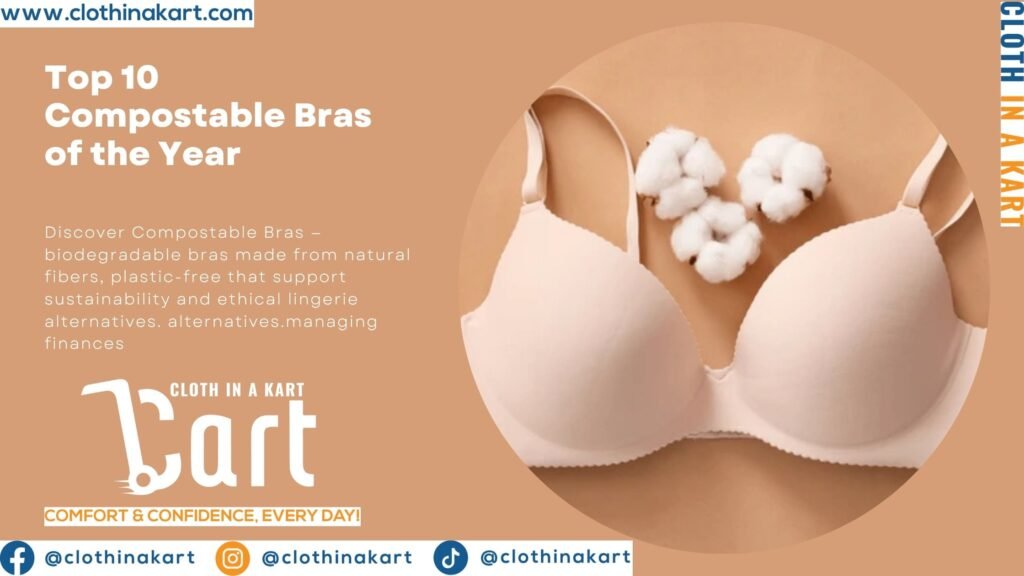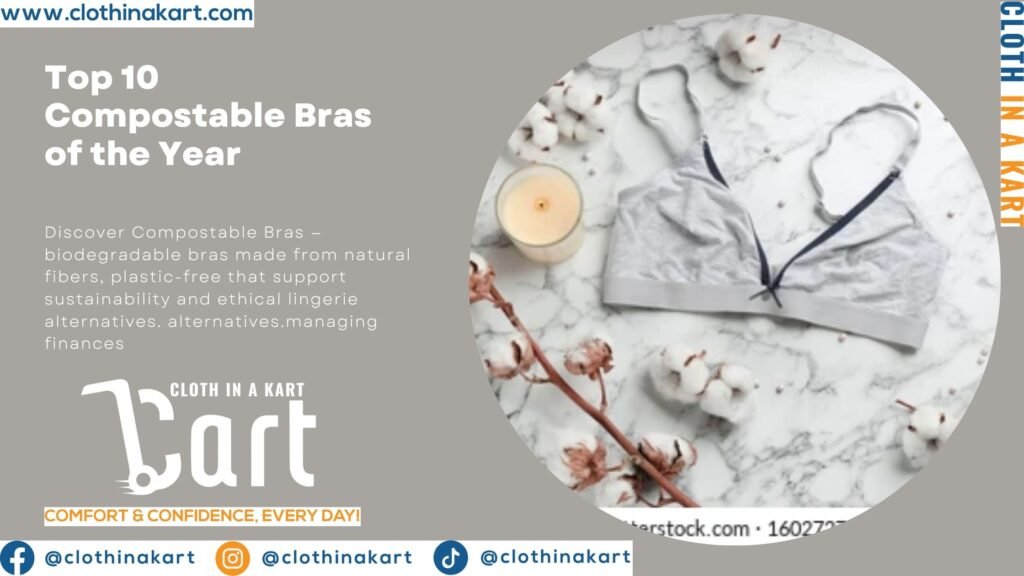Uncategorized
Top 10 Compostable Bras of the Year
- 1. Introduction
- 2. Detailed Review: Top 10 Compostable Bras
- 1. The Very Good Bra – V for Victory / Liberty Pansy
- 2. Kindly Plant‑Based Bra
- 3. Pact Organic Cotton Bra
- 4. Subset Keyhole Bralette
- 5. JulieMay Organic Cotton Bra
- 6. WAMA Organic Cotton Bra
- 7. Boody Bamboo Wireless Bra
- 8. Organic Basics Regenerative Bras
- 9. Girlfriend Collective Bralette
- 10. Cosabella Lace Bra
- Comparison at a Glance
- 3. Buyer’s Guide: What to Look For in Compostable Bras
- 4. FAQs
- 5. Final Thoughts
1. Introduction
Looking for lingerie that’s as kind to your body as it is to the Earth? Compostable bras are changing the game. These eco‑friendly bras are designed to break down naturally—no microplastics, no landfill guilt—just pure, biodegradable bliss.
Did you know the average American throws away ~11 lbs of unwanted textiles every year? That adds up fast 🧵 Compostable bras tackle this waste at the source. In the U.S., innovative brands like The Very Good Bra are pioneering 100% compostable underwear grown from organic cotton, soy‑based inks, and natural elastic.
If you’re craving sustainable lingerie, plastic‑free bras, and plant‑based styles without sacrificing comfort or style, stick around—we’ve researched the top 10 compostable and biodegradable bras, broken down their pros & cons, and curated a complete buyer’s guide. Let’s dive into the world of ethical, zero‑waste underwear that truly makes a difference!
Shop Now
2. Detailed Review: Top 10 Compostable Bras
We identified the leading compostable bras through Google research and coverage lists from trusted sustainability sources.
1. The Very Good Bra – V for Victory / Liberty Pansy
Material: Organic cotton, natural rubber elastic, GOTS dyes, soy-ink labels; 100% plastic-free components
Style & Fit: Wire-free, available in 34 sizes, supportive without underwire
Pros:
- Fully compostable (hooks, thread, labels)
- Wide size range and very comfy
- Strong brand trust and positive reviews
Cons: - Premium price (~$110 AUD)
- Shipping from Australia may involve higher cost
2. Kindly Plant‑Based Bra
Material: 80% sugarcane cup, 88% recycled nylon blend, natural elastic
Style & Fit: Wireless everyday bra with moderate support
Pros:
- Innovative use of plant-based sugarcane
- Comfortable and flattering for everyday wear
Cons: - Not fully compostable due to recycled nylon
- Limited size selection
3. Pact Organic Cotton Bra
Material: GOTS-certified cotton & small elastane blend
Style & Fit: T‑shirt, bikini, padded; fair trade with multi-pack options
Pros:
- Budget-friendly, size-inclusive (XS–3XL)
- Ethically sourced and Fair Trade certified
Cons: - Contains elastane—cannot compost
- Moderate support only
4. Subset Keyhole Bralette
Material: Organic cotton, Fair Trade-made
Style & Fit: Bralette; low support ideal for lounging
Pros:
- Plastic-free packaging; circular fashion principles
- Comfortable, versatile
Cons: - Not supportive enough for fussier use
- Limited in structured styles
5. JulieMay Organic Cotton Bra
Material: Organic cotton & peace silk; non-toxic dye
Style & Fit: Lacy, elegant, handmade in small UK/US-run factory
Pros:
- Luxurious feel; small-batch craftsmanship
- Ethically produced
Cons: - Higher cost; limited size range
- Not fully plastic-free
6. WAMA Organic Cotton Bra
Material: 100% organic cotton, GOTS-certified
Style & Fit: Bralette styles with low-to-medium support
Pros:
- Breathable and soft; PFAS-free
- Transparent supply chain
Cons: - Not padded or underwire
- Support might feel minimal for larger busts
7. Boody Bamboo Wireless Bra
Material: Bamboo viscose, recycled nylon (strap elastics) t
Style & Fit: Wireless, racerback, padded styles; moisture-wicking
Pros:
- Ultra-soft, odor-resistant, eco-friendly bamboo
- Widely available and affordable
Cons: - Contains recycled nylon—non-compostable
- Some versions include padding
8. Organic Basics Regenerative Bras
Material: Regenerative organic cotton, TENCEL™, recycled fibers
Style & Fit: T‑shirt, bralette, sports—clean, minimalist design
Pros:
- Climate-conscious and transparent footprint
- Great everyday practicality
Cons: - Contains blends—limits compostability
- May feel basic for lingerie-focused buyers
9. Girlfriend Collective Bralette
Material: 79% recycled polyester, 21% spandex vogue.com
Style & Fit: Compression sports-bralette
Pros:
- Diverts 11 plastic bottles per piece; recyclable program
- Functional and sustainability-forward
Cons: - Synthetic blends; sheds microplastics
- Not compostable
10. Cosabella Lace Bra
Material: Recycled nylon lace blended with elastane
Style & Fit: Sexy lace plunge or push-up styles
Pros:
- Italian-made, feminine, and stylish
- Some recycled content
Cons: - Synthetic mix limits biodegradability
- Less eco-credential compared to others
Comparison at a Glance
| Brand | Compostable? | Style Types | Pros | Cons |
|---|---|---|---|---|
| The Very Good Bra | ✅ 100% | Wire-free, nursing | Fully compostable, 34 sizes | Pricey + AUS shipping |
| Kindly | 🚫 | Everyday, wireless | Sugarcane cups, comfy | Not compostable; limited fit options |
| Pact | 🚫 | T‑shirt, padded, bikini | Budget-friendly; Fair Trade | Has elastane; patchy support |
| Subset | 🚫 | Bralette | Circular, natural materials | Low support |
| JulieMay | 🚫 | Lacy underwire/bralette | Luxury feel, small-batch | Pricey, limited sizes |
| WAMA | 🚫 | Bralette | Breathable organic cotton | Light support |
| Boody | 🚫 | Bamboo wireless/padded/racerback | Soft, moisture-wicking, affordable | Contains nylon; non-compostable |
| Organic Basics | 🚫 | T‑shirt, sports, bralette | Regenerative cotton, minimalist | Blendable but non-compostable |
| Girlfriend Collective | 🚫 | Sports bralette | Recycled bottles, recycling program | Synthetic fabrics; sheds microplastics |
| Cosabella | 🚫 | Lace plunge, push-up, minimizer | Stylish, Italian lace | Synthetic blend; not eco-material |

3. Buyer’s Guide: What to Look For in Compostable Bras
Here are the key factors when selecting your next eco-friendly bra:
- Material Composition
Choose 100% natural fibers—organic cotton, bamboo, TENCEL™, natural rubber. Be wary of blends with elastane/synthetics that prevent compostability. - Compostability vs. Recyclability
- Compostable bras (e.g. The Very Good Bra) can be returned to earth with worms.
- Recyclable bras (e.g. Pact, Girlfriend) still use synthetic components—but recycling may extend life.
- Certifications
Look for GOTS, OEKO-TEX, Fair Trade, Bluesign logos—these ensure nontoxic dyes, ethical labor, and minimal chemicals - Support & Style
Wire-free, underwire, plunge, push-up, sports, padded, minimizer—the compostable category currently leans toward wire-free and bralettes. For underwire or high support, priorities may shift to recyclable options or innovative plant-fiber blends. - Size Range & Fit
If you’re outside B–C cups, brands like The Very Good Bra offer 34 sizes. Others may be limited—check sizing charts carefully. - Cost & Availability
Compostables are premium (~$100+), while recycled-fiber bras like Girlfriend and Boody land mid-range. - End-of-Life Options
Can you compost it at home/with a facility? Does the brand provide take-back or recycling programs? - Brand Transparency
Brands that share sourcing info, factory practices, and certifications are more trustworthy.
4. FAQs
Q1: Are compostable bras biodegradable at home?
Most true compostable bras (e.g. The Very Good Bra) break down in home compost within a few months—check packaging for instructions.
Q2: What’s the difference between compostable and recyclable bras?
Compostables return to soil; recyclable still contain synthetics and require industrial processing or brand take-back programs.
Q3: Are plastic-free bras supportive enough for larger busts?
Yes! Brands like The Very Good Bra designed wire-free cups with structure. Read reviews—they often note “supports DD comfortably.”
Q4: Can I wash these bras like regular ones?
Absolutely—gentle cycle, cold water, air dry. Avoid bleach or hot dryers to preserve natural fibers.
Q5: How do I compost a bra with mixed materials?
Cut off fabric components and compost them; dispose of non-compostable bits like metal hooks in recycling or trash. Compostability depends on clearly natural fiber parts.
5. Final Thoughts
Compostable bras aren’t just a green trend—they’re a meaningful shift in sustainable lingerie. They offer nontoxic, biodegradable, plastic‑free lingerie made from natural fibers like organic cotton and bamboo. And though options like The Very Good Bra lead the way for zero waste underwear, other eco-conscious picks—biodegradable yet blended—offer a softer transition to compostable underwear.
Your action plan:
- Want full compostability? Choose The Very Good Bra.
- Want plant-based innovation with plant-fiber cups? Try Kindly.
- Prefer budget-friendly eco-lingerie? Go for Pact or Boody.
- Need high support? Consider certified recycled blends with recycling programs (like Girlfriend Collective).
Whichever route you take, you’re choosing ethical lingerie alternatives and contributing to a more sustainable future—one undergarment at a time.

